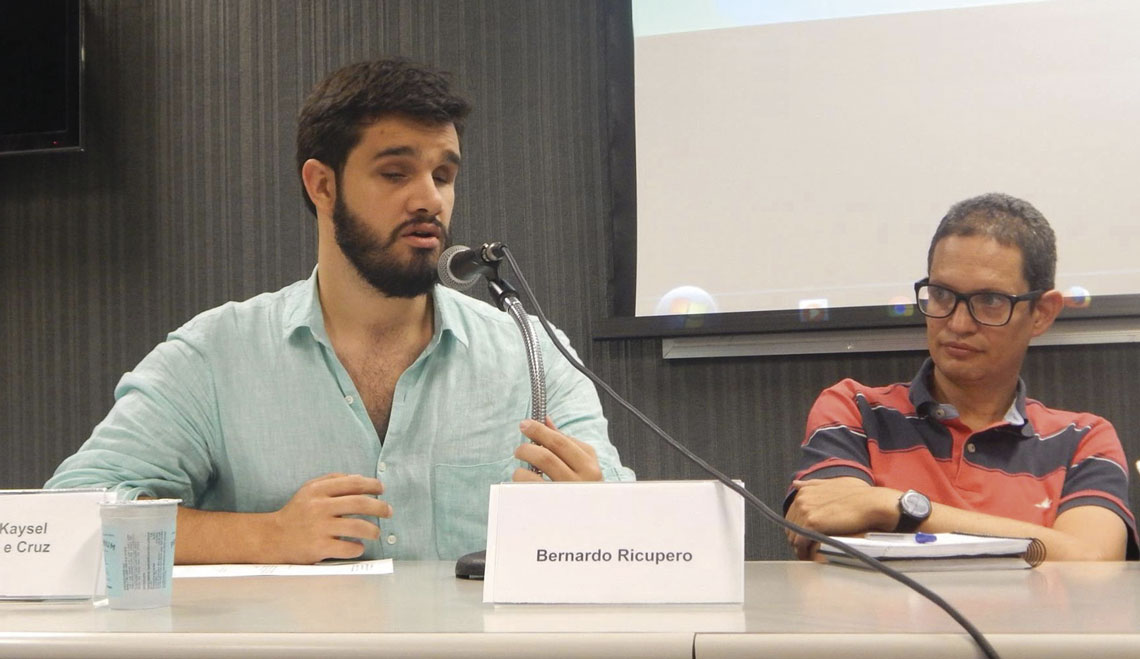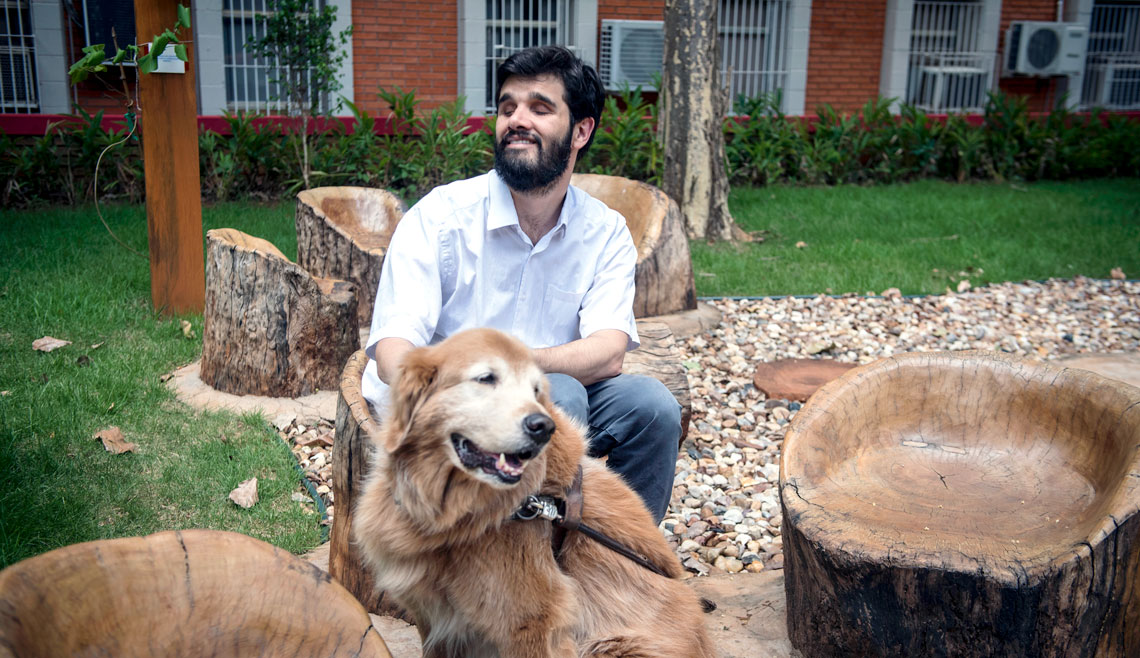When people ask me if I was born blind or went blind later in life, I always respond: both. I was diagnosed with bilateral congenital glaucoma at birth. I had very little vision, and then I lost it completely in my right eye at age 9 and in my left eye at age 22. Since my father is an ophthalmologist, I had access to good doctors and treatments. I underwent dozens of surgeries to help maintain my sight for as long as possible, but I always knew that one day it would be gone.
I haven’t seen anything for almost 20 years, but in my left eye I still see blurs of different colors—visual effects caused by physical and chemical interactions inside the eye. Ophthalmologists call this ‘entoptic phenomena.’ I once heard a story about it from the Argentine writer Jorge Luis Borges [1899–1986], who lost his sight at the age of 55. He said that blind people are not all the same—they do not only see black, as many people imagine.
I started studying at the Law School of USP [University of São Paulo] in 2002, but in the middle of my second year, I decided to transfer to the social sciences course at the university’s School of Philosophy, Languages and Literature, and Human Sciences [FFLCH]. I wanted an academic life dedicated to research and teaching. There are many teachers and researchers in my family, which was a major influence for me. My father, Antonio Augusto Velasco e Cruz, and my mother, Angela Kaysel Cruz, are professors at USP’s Ribeirão Preto School of Medicine, and my uncle, Sebastião Carlos Velasco e Cruz, was a professor at the Department of Political Science of the University of Campinas [UNICAMP], where I currently teach.
At that time, political science at USP was dominated by neo-institutionalism, which arose in the USA. The school of thought is predominant in the field to this day, focusing on the study of institutions and choices of political agents, without looking in too much detail at the social structure of which they are a part. I learned a lot, but I was more interested in the area of theory and political thought, so I focused on that and it became my specialty.
Two professors were very important to me at USP: Gildo Marçal Brandão [1949–2010] and Bernardo Ricupero, who became my postgraduate advisor. When I began my master’s degree, Brandão was just starting a major research project, funded by FAPESP, on lineages of Brazilian political thought, which I took part in from the beginning.
This opened the doors to the Department of Political Science to me, through which I met a very diverse group of political scientists and sociologists. Our objective was to find the lines of historical continuity behind Brazilian thought, developed over the period of almost a century that separates the end of the Empire in 1889 and the end of the military dictatorship [1964–1985]. It was an experience that helped me mature intellectually.
During my master’s degree, I did a comparative study on the Brazilian historian Caio Prado Júnior [1907–1990] and the Peruvian Marxist philosopher José Carlos Mariátegui [1894–1930]. For my PhD, I examined the relationship that was established between communists and nationalists in the two countries, under different circumstances, reflecting on the alliance between communists and populists in Brazil before the military coup of 1964.

Student Representatives of the Department of Political Science Postgraduate Program / USPWith Bernardo Ricupero during a meeting at USP in 2017Student Representatives of the Department of Political Science Postgraduate Program / USP
The comparison was necessary to examine the evolution of Brazilian political thought in the context of Latin America. Brazilian academia tends to be very self-absorbed, as if Brazil were isolated from the rest of the continent and from other regions. Ricupero made me understand the importance of looking at Brazil as part of something bigger.
I completed my master’s degree in 2010 and my PhD in 2014. I was close to defending my thesis when I heard about an opening at the Federal University for Latin American Integration [UNILA], in Foz do Iguaçu. Starting my career there was really significant to me. I interacted with students and teachers from various countries and had a very rich international experience without leaving Brazil. And since it was a new and small institution, everyone had to do everything. I had barely entered the classroom when I was invited to manage a course. It was crazy, but I learned a lot.
In 2016, a position was available at UNICAMP in the area of theory and political thought. I placed first in the competitive hiring process. In 2024, I completed a postdoctoral degree at the University of California, Berkeley, and I am now preparing to defend my thesis for a postdoctoral degree at UNICAMP. It is based on research I have done on anticommunism and the far right in Latin America.
None of this was easy with my visual impairment, of course. I have a guide dog who accompanies me to work every day. His name is Jed, and I got him from a foundation in New York that trains animals to help the blind. I use Braille to read signs and labels, but not much else. Specialist literature in Braille is very limited in availability. I’ve always relied heavily on technology and people who read to me out loud, like my parents, my grandmother, and fellow students.
Improvements to systems for the visually impaired known as standalone reading machines, which scan printed documents and convert the text into audio, were fundamental for me to be able to complete my master’s degree and PhD. But I still depend on how well the material I need to consult is scanned. There is a lot available on the internet, but not always in a format readable by the computer programs that help me read it.
I had great difficulty researching anticommunism, because I was working with primary sources for the first time. Archives do not have people available to help you look for what you need. They usually bring you the box you ask for and say good luck. I was only able to do my research because I had funding from FAPESP to hire research assistants, who scanned and edited the documents I studied.
Twice I traveled to consult a rich collection preserved in Paraguay, which contains documents from the World Anti-Communist League, a far-right network that operated during the Cold War and had a branch in Latin America and a subsidiary in Brazil. We copied almost 2,000 pages of documents, of which I have only been able to read a fraction so far. But I never thought it would be easy. I always knew that to be able to read and work, I would have to make use of all means possible and imaginable.
Find out more: Specialist Assistance Program for Students with Disabilities, UNICAMP
The story above was published with the title “Colors in the dark” in issue 347 of january/2025.
Republish